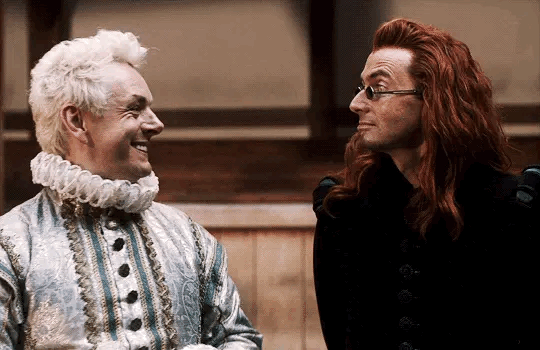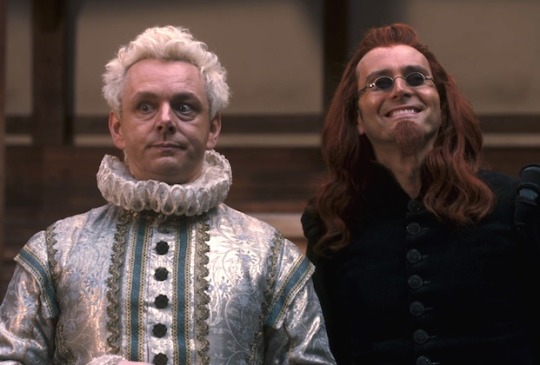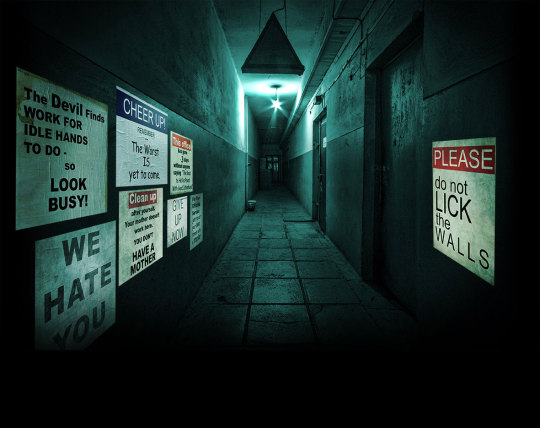#projection and displacement are integral parts of aziraphale's character
Explore tagged Tumblr posts
Text

I’ve already attached this to a re-blog, but it feels like something that I want to post as a standalone as well. Sometimes I scream into the tumblr void about shit. Thanks to a gifted copy of The Body Keeps the Score I’m doing more DIY therapy work and processing some of my thoughts through the interwebs. So here’s a brain thing.
🎶Let’s talk about projection baby, let’s talk about you and me!!🎶 All joking aside, so many of us who deal with CPTSD use fictional works to process our trauma. We are outsourcing emotions and memories that we, for whatever reason, struggle to deal with unless there is some remove from the immediacy of them. We seek to find ourselves in characters, parallels in stories and situations for our own experiences. We live their struggles and triumphs as our own and so find catharsis within them. Aziraphale as a character is a particularly good example of this. He’s doing the thing so many of us who are trying to convince everyone else and ourselves that “we’re FINE, thank you!” do. He isn’t really processing his shit. He’s putting it on a third party to release some pressure before he completely loses it. And in so doing, us the audience, have gained a character that we both empathize and sympathize with, and in turn, use to work through much of our own trauma. I honestly think that’s why so many of us are waiting for S3 with bated breath. We need Az to figure it out. We need them both to heal. To defeat the odds. To find happiness. We’re all waiting for that because we need to believe that it’s something we can have too. If this Angel who foists 6 millennia of grief and rage and maddening questions about the “why” of everything off into an entire bookshop’s worth of stories and characters, if he can figure it out…surely we can too. Surely there is hope for us buried somewhere in the stacks. Surely there is some understanding that can be found, some catharsis or healing within the lines of these narratives. So we’re all holding our breath, our hope and our hearts, in our hands, waiting to finish the story, and in so doing, complete some part of ourselves. Finally framing those cracks where the light comes in, into something beautiful.
#good omens#aziraphale#good omens meta#DIY therapy it’s like DIY electrical you can but you’ll probably get zapped a few times#tumblr is the void into which we scream#come void scream with me we’ll be like the hallelujah chorus#but off key terribly off key it’s amazing#projection and displacement are integral parts of aziraphale's character#self projection#this is really good diy therapy though we’re all out here being diyers#doing the work#books that saved our lives#books have always saved my life#neil gaiman#Neil Gaiman we are in your walls
46 notes
·
View notes
Text
🎶Let’s talk about projection baby, let’s talk about you and me!!🎶 All joking aside, so many of us who deal with CPTSD use fictional works to process our trauma. We are outsourcing emotions and memories that we, for whatever reason, struggle to deal with unless there is some remove from the immediacy of them. We seek to find ourselves in characters, parallels in stories and situations for our own experiences. We live their struggles and triumphs as our own and so find catharsis within them. Aziraphale as a character is a particularly good example of this. He’s doing the thing so many of us who are trying to convince everyone else and ourselves that “we’re FINE thank you!” do. He isn’t really processing his shit. He’s putting it on a third party to release some pressure before he completely loses it. And in so doing, us the audience, have gained a character that we both empathize and sympathize with, and in turn, use to work through much of our trauma. I honestly think that’s why so many of us are waiting for S3 with bated breath. We need Az to figure it out. We need them both to heal. To defeat the odds. To find happiness. We’re all waiting for that because we need to believe that it’s something we can have too. If this Angel who foists 6 millennia of grief and rage and maddening questions about the “why” of everything off into an entire bookstore’s worth of stories and characters, if he can figure it out…surely we can too. Surely there is hope for us buried somewhere in the stacks. Surely there is some understanding that can be found, some catharsis or healing within the lines of these narratives. So we’re all holding our breath, our hope and our hearts in our hands, waiting to finish the story, and in so doing, complete some part of ourselves. Finally framing those cracks where the light comes in, into something beautiful.
Buck up, Hamlet!

***Trigger warning: Death and taking your own life in the context of Shakespeare***
Aziraphale likes Hamlet. Likes the play so much, that he bats his eyelashes at Crowley until the demon performs a miracle to make the mopey Prince of Denmark more popular. Well, good job, the both of you, because four hundred and some odd years later, you still can't get through repertory auditions without some bugger hoisting a skull and starting that monologue. Not that I don't appreciate Hamlet from a structural and analytical perspective. And the Prince of Denmark is a character most actors would sacrifice several toes to play. But it's dark. It's not a fun one.

So why does Aziraphale like it so much? Why's this fluffy little angel so Hell-bent on one of Shakespeare's tragedies? Join me, friendly Good Omens scholars, and let's suss some shit out.
Crowley adamantly dislikes Shakespeare's tragedies. "This isn't one of Shakespeare's gloomy ones, is it? Arghhhh. No wonder no one is here," he complains, wilting like a floppy noodle. Of course, it doesn't take much for Aziraphale to weasel the demon into miracling more people into the audience. But Crowley makes a point to say that he "still prefer(s) the funny ones" as he's leaving The Globe.
Crowley, I would argue, goes to the theatre to escape his real-life situation. He's a bloody demon who, when he's not stationed on Earth, literally goes to Hell. And it's not a nice place. Crowley's everyday life (particularly when he's not around Aziraphale) revolves around pain and suffering--whether its his or someone else's is insignificant. What matters is that regularly sees and experiences tangible, visceral representations of tragedy in his actual existence. Of course he prefers Shakespeare's funny ones! They're a reminder that the world and the human race that he's accidentally become so attached to is full of more than torment and affliction. Crowley doesn't appreciate Shakespeare's tragedies because they're an extension of his own suffering, with which he's already intimately familiar. For Crowley, attending a Shakespearean tragedy is like picking a scab. You already know you've been injured and fussing with the damned thing only makes it worse.

This is not the case for Azirapahle. As an angel, he's not allowed to have any scabs, much less pick at them. Like Crowley, he sees suffering in the world. He knows that humanity is constantly facing difficult odds, and even the most wonderful of human lives eventually ends in death. But unlike Crowley, Aziraphale works within a system in which there is no gray space--and therefore, no room for an angel, an agent of the side of righteousness, to experience doubt in the Ineffable Plan. The Heavenly model is to deal with problems by pretending they don't exist. Heaven has an image to maintain, after all. Like, the sheer amount of repression we see amongst the Heavenly Host is honestly terrifying. I'm thinking about the way in which The Metatron frames the Fall and damnation of a third of the angels. "For one Prince of Heaven to be cast into the outer darkness makes a good story. For it to happen twice, makes it look like there is some kind of institutional problem." It's so cold and removed because to process something so traumatic would not fit the image of Heaven. So it's neatly boxed up and packed away into a soundbite that better fits Heaven's corporate brand.

Aziraphale's suffering is certainly no less than Crowley's. The angel's trauma is repressed. It's cloaked in shining bright hallways of pure angelic light. It's hidden behind false words and tight smiles. It's communicated passive-aggressively by abusers who still have the angel caught in their web of control and manipulation. At least Crowley's trauma is visible. When he fell, the demon took on a new appearance that physically demonstrates his suffering. He has access to feelings of anger and frustration and he's allowed to express these things because he's a demon. He doesn't have to be good.
Since Aziraphale is not permitted to own his emotions and his trauma, he outsources them. He enjoys Shakespeare's tragedies because they give him the opportunity to achieve second-hand catharsis. He may not be able to admit that he's suffering, but he can experience Hamlet's pain vicariously.
***Reminding you of that trigger warning, folks!***

And this is where we get to the question, "To be, or not to be?" This is the moment in S1 E3 when Aziraphale interacts with Richard Burbage, and shouts out, "To be! Not to be! Come on, Hamlet, buck up!" He says this with this coy little smile, obviously trying to get a laugh out of Crowley. But it's indicative of a more serious dilemma that the angel, himself, must parse out. In Shakespeare's play, Hamlet's query is expressed as he wrestles with the choice between life and death. Essentially, it's a contemplation of suicide--a dark part of humanity that Heaven manages by eternally condemning those who would risk it. However there's another way to read this question, not as life and death, but as agency and the lack thereof. We think of "to be" as the choice for life and "not to be" as the option for suicide. But the only way in which Hamlet can express his agency is by taking control of the one thing that truly belongs to him: his own life. So when asking this question of an eternal being, what exactly does it mean, "To be?" What does it mean for Aziraphale to express agency in his immortal existence?
In Western thought, we tend to divide things into binaries: right and wrong, black and white, good and evil...to be or not to be. Back in the Garden if Eden, Crowley first introduced Adam and Eve to the idea that they had a choice. The serpent presented two options, obey or disobey God's authority. Though I think a better way of looking at it would be to say, passively accept your role or have agency in your fate. This is Crowley's method. He never pushes temptations upon you. He just wants to make sure you know all your options.

Like Hamlet, Aziraphale is presented with the choice of, "To be or not to be?" He can sign on the dotted line and follow Heaven's authority or he can be an angel with agency, an angel that goes along with Heaven as far as he can. And though Aziraphale still struggles with how exactly free will pertains to angels, Crowley shows him time and time again that he has options--he can make his own choices. From the very first interaction between the angel and the demon on the wall of Eden, Crowley (ever the optimist) knows there is hope for some meaningful connection with Aziraphale, because the angel makes a choice for himself: he gives away his sword. And from that moment, Crowley realizes that this angel might be just enough of a bastard to be worth knowing.

It's no wonder Aziraphale gets attached to the tragedy of Hamlet. It allows him to observe and process the darker and more difficult emotions that he, as an angel, struggles to manage. And perhaps more importantly, the Prince of Denmark's famous soliloquy mirrors of Crowley's method of temptation, wherein the demon simply reminds him that he has a choice and that, even as an angel, he can find ways to express his agency.
#projection and displacement are integral parts of aziraphale's character#look I’m using a 6000 yesr old man shaped celestial being to work through some shit ok?#when shared religious trauma is a bigger hang up for you than the apocalypse you may need therapy#I definitely need therapy#this is really good DIY therapy though we’re all out here being DIYers#good omens meta
310 notes
·
View notes